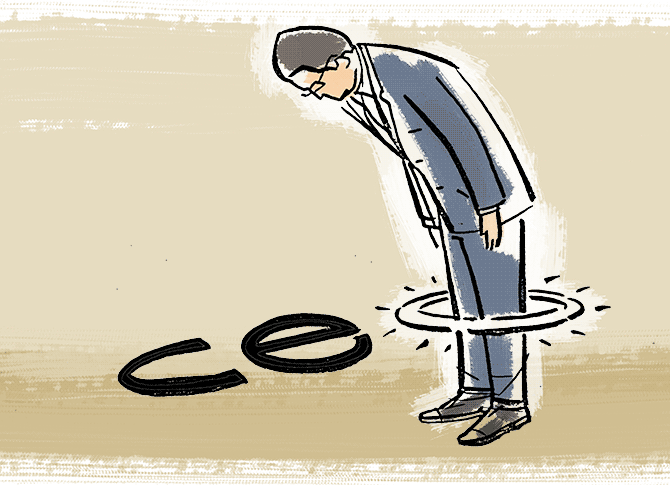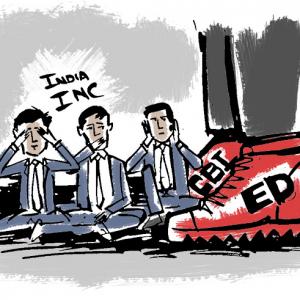The compensation to the top management was equivalent to 1.12 per cent of the companies’ net profit on average in FY19 (against 1.09 per cent a year ago) and highest in the last three years.
While the combined net profit of 118 companies where annual CEO compensation was over Rs 1 crore was up 3.7 per cent YoY last fiscal, a sharp deceleration from 26.9 per cent growth in the previous year.
Illustration: Dominic Xavier/Rediff.com

The economic slowdown has started to weigh on executive compensation for India’s top-listed companies but chief executive officers (CEOs), and other CXOs look better placed than shareholders.
The combined compensation of India Inc CEOs including promoter directors and professional board-level executives was up 6.3 per cent year-on-year (YoY) in financial year 2018-19, growing at the slowest pace in at least four years.
In comparison, top management compensation was up 35 per cent in the previous year.
The compensation growth was, however, much faster than the underlying growth in corporate profitability.
The combined net profit of 118 companies where annual CEO compensation was over Rs 1 crore in the Business Standard sample was up 3.7 per cent YoY last fiscal, a sharp deceleration from 26.9 per cent growth in the previous year.
As a result, the burden of executive compensation increased for companies.
The compensation to the top management was equivalent to 1.12 per cent of the companies’ net profit on average in FY19 (against 1.09 per cent a year ago) and highest in the last three years.
The burden was much higher and in double-digits for quite a few mid-sized companies and gains largely going to promoter CEOs.
Experts attribute the apparent inelasticity of CEOs compensation to organisational challenge of retaining and hiring top talent in a tough business environment.

“The economic slowdown has little impact on CXO compensation. It is far tougher for companies to get a seasoned executive in the current economic environment, which means paying higher increments to the existing management and generous hike if they want to hire a new CEO or chief financial officer (CFO),” says Pankaj Dutt, managing partner-India and Malaysia, Alexander Hughes, a recruitment firm.
Experts attribute the relatively slower growth in total compensation to the decline in commissions in line with poor corporate profitability.
According to Dutt, unlisted companies are now more generous in rewarding their CXOs compared to listed companies which face a lot of scrutiny.
“When corporate earnings take a hit, shareholders are much more reluctant to approve generous pay for the top management.
"Unlisted companies that face no such scrutiny can still pay top dollar salary to a CEO if the management believes in his or her ability,” he adds.
The analysis is based on the financial data of a common sample of 118 companies whose compensation for board-level executives was available for FY19.
In all these companies had a total of 209 executives or board members with annual compensation of Rs 1 crore or more last financial year.
A typical senior executive in our sample drew a salary, including commissions and bonuses of Rs 7.2 crore in FY19, up from Rs 6 crore a year ago.
The number was Rs 3.2 crore in FY15.
The average compensation was, however, unchanged at around Rs 11.9 crore in FY19.

Market analysts are not very pleased with the trend of top management pay growing faster than overall corporate earnings.
“In tough times, the top management should be more than willing to take a salary cut as it inspires shareholder confidence and lowers the cost burden for companies as expenses on top management are a significant part of the overall operating expenses, especially for small and mid-sized firms,” says G Chokkalingam, founder & CEO, Equinomics Research & Advisory Services.
He doesn’t buy the argument that it is tough to retain and hire high performers in times of a slowdown.
“In the vast majority of companies, promoters themselves are top management and their economic interest should be aligned with that of non-promoter shareholders,” says Chokkalingam.
There is some merit in this argument.
In many mid and small-sized companies, the top management salary is a significant cost burden for companies.
For example, in case of Sun TV Network, the total compensation to the top management was equivalent to 12.3 per cent of net profits in FY19; the ratio was 13.3 per cent for Amara Raja Batteries and 11.7 per cent in case of Apollo Tyres.
For slightly bigger firms, it was in the range of 5 to 10 per cent, which the analysts say is on the higher side due to the uncertainty around corporate profitability right now.
“As a matter of principle, executive compensation should be aligned with corporate performance and there should be a fair distribution of gain and pain among various stakeholders,” says a head hunter on condition of anonymity.
Management compensation is, however, a relatively small burden for large companies and India’s big business houses.
For example, the compensation to the top management was equivalent to just 0.2 per cent of Reliance Industries’ net profits - India’s largest company.
The ratio was even lower at 0.1 per cent for Tata Consultancy Services, Tata group’s most profitable company.
Other big companies with very low top management salary to net profit ratio include HDFC Bank (0.1 per cent), Infosys (0.2 per cent), ITC (0.2 per cent), Tata Steel (0.3 per cent), Kotak Mahindra Bank (0.2 per cent) and Vedanta (0.6 per cent).
Among other leading companies, the ratio of top management salary to net profit was slightly higher at 1.4 per cent at Larsen & Toubro, while for Bajaj Auto, it was 1.2 per cent.
Hero MotoCorp at 2.6 per cent and Ultratech Cement with 1.5 per cent were a little more generous to their top management.










